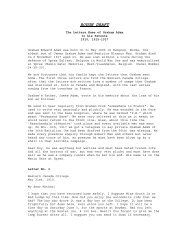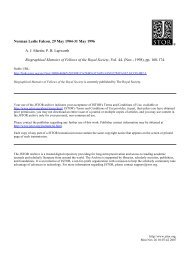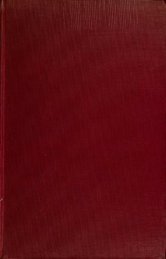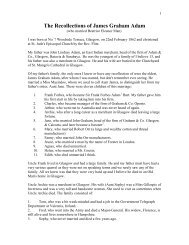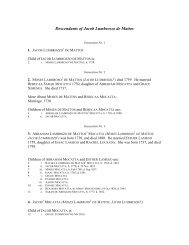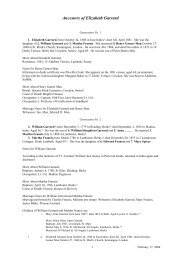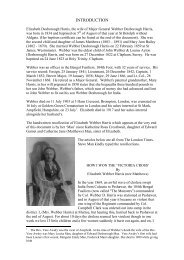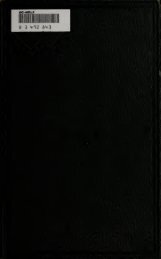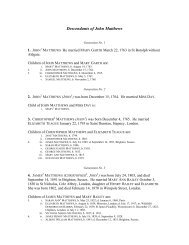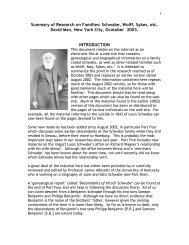Richard Craddock's Career with the East India Company - Man Family
Richard Craddock's Career with the East India Company - Man Family
Richard Craddock's Career with the East India Company - Man Family
You also want an ePaper? Increase the reach of your titles
YUMPU automatically turns print PDFs into web optimized ePapers that Google loves.
50<br />
The indigo we bring <strong>the</strong>nce, is a good and rich commodity.<br />
It is <strong>the</strong>re made of little leaves, not bigger than those on<br />
our gooseberry bushes, and <strong>the</strong> shrubs that bear those<br />
leaves are about <strong>the</strong>ir bigness. These leaves <strong>the</strong>y strip off<br />
from <strong>the</strong> small branches of those bushes, which grow <strong>with</strong><br />
round and full heads <strong>with</strong>out pricks. The leaves thus<br />
stripp'd off, are laid in great heaps toge<strong>the</strong>r certain<br />
days, 'till <strong>the</strong>y have been in a hot sweat, <strong>the</strong>n <strong>the</strong>y are<br />
removed, and put into very great and deep vessels fill'd<br />
<strong>with</strong> a sufficient quantity of water to steep <strong>the</strong>m in, where<br />
<strong>the</strong>y leave <strong>the</strong>ir blue tincture, <strong>with</strong> <strong>the</strong>ir substance; this<br />
done, <strong>the</strong> water is drain'd out into o<strong>the</strong>r exceeding broad,<br />
but very shallow vessels or vats, made of plaster,(like to<br />
that we call plaster of Paris) which will keep in all <strong>the</strong><br />
liquor 'till <strong>the</strong> hot fun in Short time extracts <strong>the</strong><br />
moisture from it; and <strong>the</strong>n what remains in <strong>the</strong> bottom is a<br />
cream about a quarter of an inch thick, which suddenly<br />
becomes hard and dry, and that is our indigo; <strong>the</strong> best sort<br />
whereof comes from Biana, near unto Agra, and a coarser<br />
sort is made at Cirkeese, not far from Amadanaz<br />
[Ahmadabad]; about which two places are a very great number<br />
of those shrubs planted which bear those leaves. From:<br />
Terry, Edward. A voyage to <strong>East</strong>-<strong>India</strong>; wherein some things<br />
are taken notice of, in our passage thi<strong>the</strong>r, but many more<br />
in our abode <strong>the</strong>re, <strong>with</strong>in that ... London, 1777 (based on<br />
<strong>the</strong> 1655 reprint)<br />
i Gokhale, B. G. (1969) Ahmadabad in <strong>the</strong> XVIIth Century. Journal of <strong>the</strong><br />
Economic and Social History of <strong>the</strong> Orient. Vol 12., No 2 pp 187-197.<br />
ii This passage is quoted by Steven C. A. Pincus (1992) ‘Popery Trade<br />
and Universal Monarchy; The ideological context of <strong>the</strong> Outbreak of <strong>the</strong><br />
Second-Anglos Duct War in The English Historical Review No. CCCCXXII.<br />
iii Saltpetre is a white crystalline substance and is <strong>the</strong> chief<br />
constituent of gunpowder.<br />
iv In south and west Asia, a maund was a unit of weight, varying greatly<br />
in value according to locality. In 1665 one maund was worth £6.<br />
v The letter did not arrive in Surat until 22 November 1656.<br />
vi The source for this is not EFI but European Merchant Capital and <strong>the</strong><br />
<strong>India</strong>n Economy by Rubi Maloni pp.287-288<br />
vii See Stiffe, A.W. (18) Ancient Trading Centres of <strong>the</strong> Persian Gulf<br />
VI Bandar Abbas. P. 212.<br />
viii Aungier, Gerald (1635x40–1677), administrator in <strong>India</strong>, was born in<br />
Ireland, probably in Dublin, <strong>the</strong> second son of Ambrose Aungier (c.1597–<br />
1654), at various times prebendary, treasurer, and chancellor of St<br />
Patrick's Ca<strong>the</strong>dral, Dublin, and Griselda or Grizel (d. 1666), daughter<br />
of Launcelot Bulkeley, archbishop of Dublin and primate of Ireland, and<br />
bro<strong>the</strong>r of Francis Aungier, later first earl of Longford (c.1632–1700).<br />
Aungier was admitted to <strong>the</strong> <strong>East</strong> <strong>India</strong> <strong>Company</strong> (1 November 1661) as a<br />
factor for Surat, on a salary of £30 per year. He arrived in <strong>India</strong> (18



